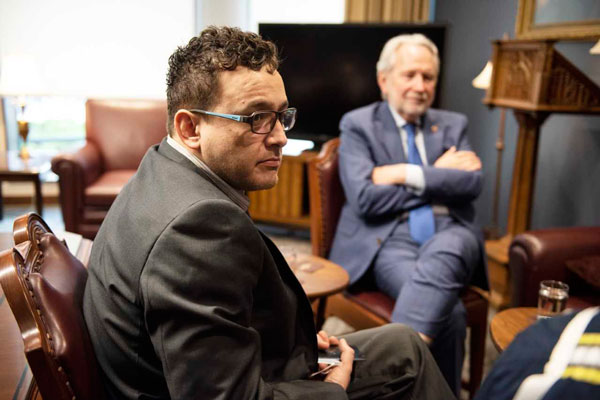
“What is the future that we are all striving to achieve? Can we articulate it? Can we visualize it?”
– Sen. Scott Tannas
Prince Albert’s Trevor Dubois voiced topics important to Indigenous youth at the Senate last week, including language programs, mental health and child welfare services.
Dubois is a two-spirit, Métis Indigenous social worker at Métis Central Western Region II Council.
He travelled to Ottawa to participate in Youth Indigenize the Senate last Tuesday to Thursday after being nominated by his boss. Eight youth leaders across Canada attended.
The initiative, which has been taking place for four years, uses the participants’ testimonies for a study about the relationship between Canada and First Nations, Inuit and Métis peoples.
“It helps myself to know that people like myself and other marginalized individuals have that input,” said Dubois.
“We talked about lots. I talked about the environment for instance with the oil and gas—the need to think about Seven Generations (Energy) going forward, like yes they need to provide the resources for the economy to grow, but also doing it in the most environmental means possible,” he said.
Another topic Dubois brought forward is Indigenous languages.
“(There’s a) need for adequate funding for language programs and more supports and services that teach younger (people) that language is important, a vital part of one’s culture.”
Sen. Scott Tannas said the initiative came from the need to hear not only from elders, but also from young people.
While he said (Indigenous and Northern Affairs Canada) has been focusing on current issues arising from the past, Tannas emphasized the future.
“This Indigenize the Senate idea really fed into that desire of the committee to try and hear voices that can speak to the future and minds that are focused on the future,” he said. “What is the future that we are all striving to achieve? Can we articulate it? Can we visualize it? And if we can get some clarity around that, it will become easier to build a path to something that you can actually see quite clearly.”
“What would a Prime Minister say 20 years from now if she went to the United Nations with a story of success?” he questioned. “For many Canadians and I think for many decision makers amongst Canadians, that is not 100 per cent clear.”
Dubois said he’s especially thankful for meeting Sen. Lillian Dyck, a member of Saskatchewan’s Gordon First Nation.
She’s known for her advocacy for Indigenous issues—Dubois said resolving them are important for enhancing Indigenous culture.
“It keeps the person grounded, knowledgable and it builds on their identity,” he said.
The nominees each had about 10 minutes to testify to senators. They also engaged in discussions and exercises with each other.
—with files from Peter Lozinski

